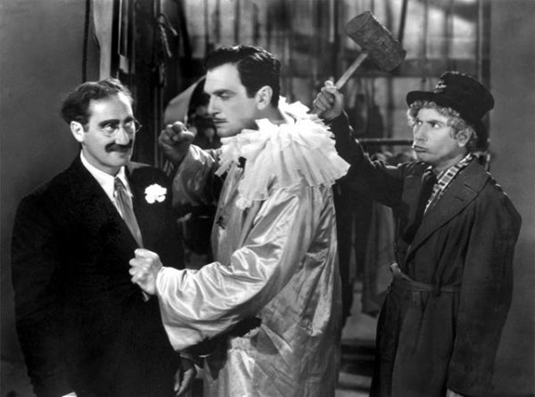Plot Devices
AJ Robinson

In acting, there’s an old saying, never work with children or animals. One, they’re difficult. Two, they always steal the scene.
Children and animals are good plot devices.
However, when it comes to writing, both are among an arsenal of useful plot devices. One of the chief axioms of writing is this, “Show, don’t tell.” As much as possible, you don’t want to tell your audience things about your characters, you want them to learn those things by seeing the actions.
That’s where children and animals can come in handy. Something as simple as a character showing kindness to a child or a stray animal can convey so much about a person. On the other side, one mean act toward the same tells the audience that person is no good.
In the movie, “Nanny McPhee,” the father seeks to find a new mother for his large brood of children, seven in all. To that end, he prepares to marry a perfect horrid woman.
Before the ceremony, the horrid bride to be meets with her about-to-be-step children. She wants to lay down the law. She wants to be clear regarding who will be in charge in her new home.
The youngest, just a baby, shakes her rattle, which irritates the woman. She takes the rattle and breaks it. Not only is that mean, but the rattle was the only keepsake the children had from their mother.
That pretty much does it for the bride-to-be right there. In the eyes of the audience, she is no good and must go. She’s the father opts out of the marriage, choosing a much nicer woman instead. Oh, and a restored rattle drops from the heavens for the baby.
Finding a foil for Harpo.
Back in the 1930s, the Marx Brothers had a similar method for manipulating their fans. They knew that everyone loved Harpo. He was like a big kid. Thus, establishing the protagonist and antagonist in their movies was easy: see how they treat Harpo.
In “A Night at the Opera,” the egotistical opera singer has Harpo as his dresser. Well, the first time the two are together in his dressing room, what does he do? He beats Harpo. That’s it, right there, the man is officially pure evil and beyond redemption.
On the other hand, when he throws Harpo out, whom does Harpo encounter? Well, the sweet innocent young woman, an opera singer so talented, but has little reputation. She’s kind to Harpo and this wins over the audience.
As well, a character can show their true colours or maybe redeem themselves, often by the smallest of acts. In “Home Alone 3,” Alex, the little boy has an older brother and sister. Both are very mean to Alex, all through the film. Well, near the end, they get a chance to show their true colours.
The FBI shows up at their school and talks to their mom and the older boy. The agents assume Alex is the one who called the Air Force about a computer chip. The mom explains that it was Alex and that he’s at home; she asks if he’s in danger.
The FBI man doesn’t answer. Stan, brother of Alex, says, “She asked you a question, sir!” He says it firmly, yet still with respect. The FBI man says he can’t talk about it. Then it’s time for Molly, the sister, to step up to the plate. She dashes forward, slams the door so they can’t get out, and says, “The ‘it’ you’re referring to is my little brother!”
Actions speak louder than do words when building characters.
Two small acts loaded meaning. The siblings show that, although they might tease and torment their little brother, they do love him. When building a story, always look for the little acts you can insert into your writing to show your audience, readers, viewers or listeners, what kind of characters you write and, thus, why they are so compelling.
Combining the gimlet-eye of Philip Roth with the precisive mind of Lionel Trilling, AJ Robinson writes about what goes bump in the mind, of 21st century adults. Raised in Boston, with summers on Martha's Vineyard, AJ now lives in Florida. Working, again, as an engineeer, after years out of the field due to 2009 recession and slow recovery, Robinson finds time to write. His liberal, note the small "l," sensibilities often lead to bouts of righteous indignation, well focused and true. His teen vampire adventure novel, "Vampire Vendetta," will publish in 2020. Robinson continues to write books, screenplays and teleplays and keeps hoping for that big break.
- Three Percent
- Cutting the Red Tape
- Mind Your Manners
- A Man and His Story
- The Thought Counts
- Her Voice
- Flying Away
Click above to tell a friend about this article.
Recommended
- David Simmonds
- Far Away Places
- Macaws and Elephants
- Legend of Deep Gap

- Sjef Frenken
- A Bird in the Hand
- Contact
- An Untold Story

- Jennifer Flaten
- Hot Dogs
- Clothspin Corpses
- Sanitized

- M Alan Roberts
- Fire Ring
- Wake Up or be Killed
- Festered Boil

Recommended
- Matt Seinberg
- Roadies
- Military Parades
- Taking the Train

- Bob Stark
- Paranoid Society
- Pinocchio's Son
- Rainbow Warrior

- Streeter Click
- Reviews of All Sort
- CFRA 1968
- A Brief Review

Recommended
- AJ Robinson
- Top Three GOP Sins
- The Frog Boils
- Fuzzy Was It

- Jane Doe
- Ex Machina
- Dominion
- Recovery Redux

- M Adam Roberts
- Thanks a Million
- The Builder
- The Secret

- Ricardo Teixeira
- Harmony
- Monkey Business
- There is a Light



